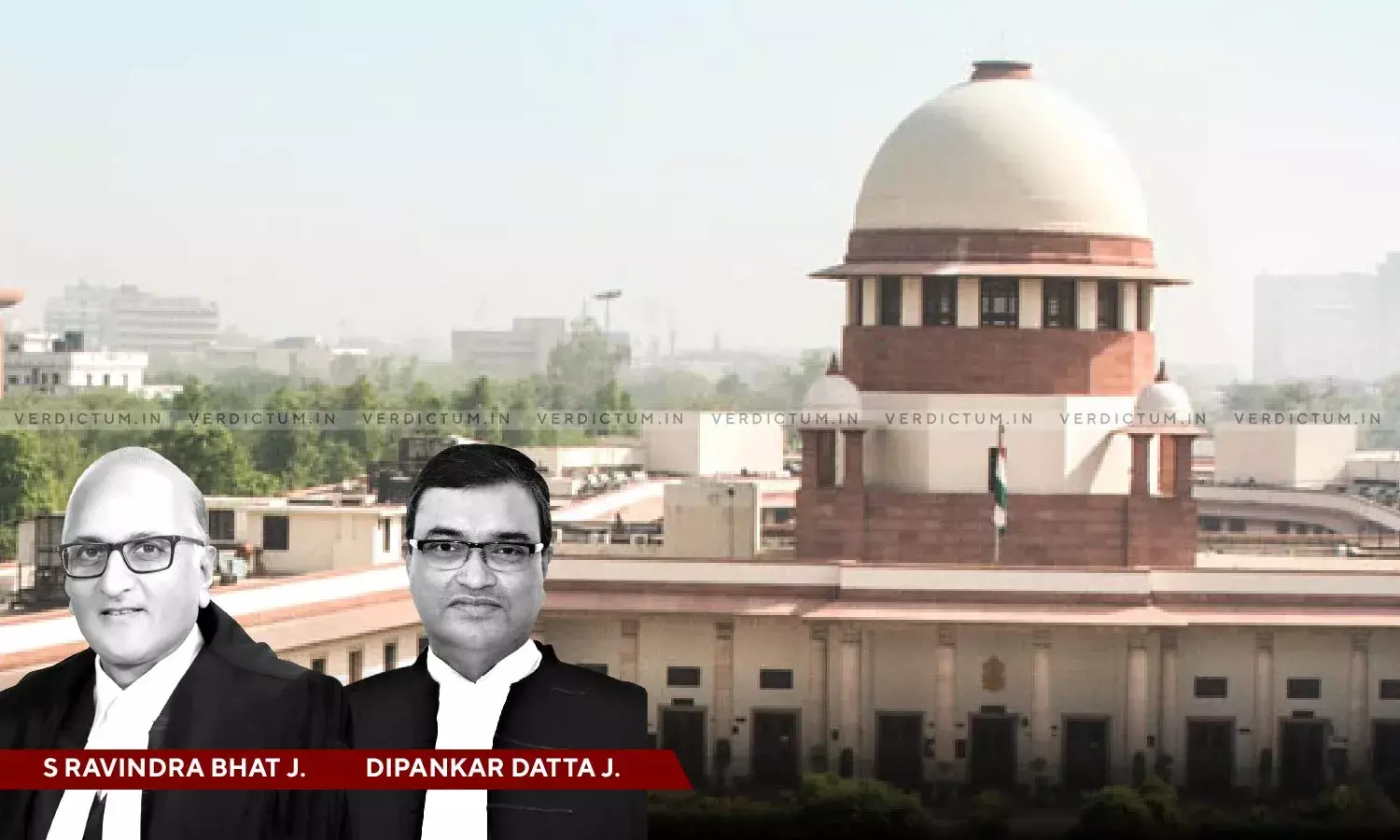Prevention Of Corruption Act: HCs Must Maintain A "Hands-Off" Approach & Not Quash FIRs At Investigation Stage- SC

A Supreme Court Bench of Justice S Ravindra Bhat and Justice Dipankar Datta has observed that "it would be eminently desirable if the high courts maintain a hands-off approach and not quash a first information report pertaining to “corruption” cases, specially at the stage of investigation, even though certain elements of strong-arm tactics of the ruling dispensation might be discernible."
Senior Advocate Kapil Sibal appeared for the State. Senior Advocate Sanjay Hegde assisted by AOR Pranjal Kishore and Senior Advocate Mahesh Jethmalani appeared for the Appellant side.
In this case, an appeal was preferred against a Judgment passed by the Chhattisgarh High Court, which had quashed a disproportionate assets case registered against the former Principal Secretary of the former Chief Minister and the wife of the Principal Secretary.
There were complaints against the IRS officer and his wife for corruption and money laundering, and that the couple held assets disproportionate to their declared sources of income.
An FIR was launched against them, which was quashed by the High Court. Consequently, petitions were moved before the Supreme Court.
The issue for consideration before the Supreme Court was whether and to what extent would a court exercising power under Article 226 of the Constitution or section 482 of the Code of Criminal Procedure be justified to quash a first information report registered under section 13 of the P.C. Act while the police embark on an investigation against a public servant.
The Apex Court took the view "Tracking down corrupt public servants and punishing them appropriately is the mandate of the P.C. Act. “We the people”, with the adoption of our Constitution, had expected very high standards from people occupying positions of trust and responsibility in line with the Constitutional ethos and values. Regrettably, that has not been possible because, inter alia, a small section of individuals inducted in public service for ‘serving the public’ appear to have kept private interest above anything else and, in the process, amassed wealth not proportionate to their known sources of income at the cost of the nation."
Further, the Court observed that "The law of the land abhors any public servant to intentionally enrich himself illicitly during the tenure of his service. Increase in the assets of such a public servant tantamount to constitutionally impermissible conduct and such conduct is liable to be put under the scanner of the P.C. Act."
On a reading of the FIR, the Court noted that "we are unable to appreciate the reasons resting whereon the same has been quashed by the High Court." and in furtherance of the same observed that "While deciding the challenge to the FIR, the High Court – unwittingly, we presume – did not bear in mind the note of caution in Bhajan Lal (supra) to the effect that the power of quashing a criminal proceeding should be exercised very sparingly and with circumspection and that too in the rarest of rare cases; further that, the court will not be justified in embarking upon an enquiry as to the reliability or genuineness or otherwise of the allegations made in the FIR or the complaint; and also that, the extraordinary or inherent powers do not confer an arbitrary jurisdiction on the court to act according to its whim or caprice."
Relying on the case of CBI & Ors. Vs. Tapan Kumar Singh, the Court observed "it being the settled principle of law that when an investigation is yet to start, there should be no scrutiny to what extent the allegations in a first information report are probable, reliable or genuine and also that a first information report can be registered merely on suspicion, the High Court ought to have realized that the FIR which, according to it, was based on “probabilities” ought not to have been interdicted. Viewed through the prism of gravity of allegations, a first information report based on “probability” of a crime having been committed would obviously be of a higher degree as compared to a first information report lodged on a “mere suspicion” that a crime has been committed. The High Court failed to bear in mind these principles and precisely did what it was not supposed to do at this stage."
On the procedure to be followed by the High Courts in cases under the PC Act, the Court was of the considered view that "the proper course for the high courts to follow, in cases under the P.C. Act, would be to permit the investigation to be taken to its logical conclusion and leave the aggrieved party to pursue the remedy made available by law at an appropriate stage. If at all interference in any case is considered necessary, the same should rest on the very special features of the case. Although what would constitute the special features has necessarily to depend on the peculiar facts of each case, interference could be made in exceptional cases where the records reveal absolutely no material to support even a reasonable suspicion of a public servant having intentionally enriched himself illicitly during the period of his service and nothing other than mala fide is the basis for subjecting such servant to an investigation."
In the furtherance of the same, the Court also observed that "we do not intend to fetter the high courts from intervening in appropriate cases, it is only just and proper to remind the courts to be careful, circumspect and cautious in quashing first information reports resting on mala fide of the nature alleged herein."
Consequently, the Apex Court set aside the impugned judgment, and the appeals were allowed.
Cause Title: The State of Chattisgarh & Anr v. Aman Kumar Singh & Ors. Etc. Etc.
Click here to read/download the Judgment

